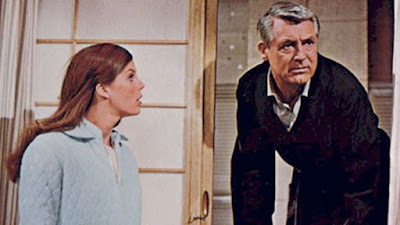On today's date back in 1937, Cary Grant's 27th full length feature film, Topper, was released.
Summary:
The fun-loving Kerbys, stockholders in the bank of which henpecked, stuffy Cosmo Topper is president, drive recklessly once too often and find that they died and are now ghosts. In limbo because they've never done either good or bad deeds, they decide to try a good one now: rehabilitating Topper.
Cast:
Constance Bennett...Marion Kerby
Cary Grant...George Kerby
Roland Young...Mr. Cosmo Topper
Billie Burke...Mrs. Clara Topper
Alan Mowbray...Wilkins
Eugene Pallette...Casey
Arthur Lake...Elevator Boy
Hedda Hopper...Mrs. Grace Stuyvesant
Virginia Sale...Miss Johnson
Theodore von Eltz...Hotel Manager
J. Farrell MacDonald...Policeman (as J. Farrell McDonald)
Elaine Shepard...Secretary
Doodles Weaver...Rustic
Si Jenks...Rustic
Three Hits and a Miss...Three Hits and a Miss
Did You Know?
The easiest parts of the shoot for Cary Grant and Constance Bennett were the many special effects scenes, which only required them to record their lines while special effects artists made the various items they moved, from fountain pens to a pair of frilly lace panties, appear to move on their own.
Hal Roach immediately wanted Cary Grant to play George Kerby, but he had difficulty getting the actor to agree to play the part, since Grant was concerned about the supernatural aspects of the story. Assurance from Roach that the screwball aspects of the story would be played up - plus a fee of $50,000 - were sufficient to convince Grant to do the film.
This was the first black & white film to be "colorized" in 1985.
This was the second film appearance of Lana Turner; she was uncredited and had no lines.
Producer Hal Roach wanted W.C. Fields and Jean Harlow to star as, respectively, Cosmo Topper and Marion Kerby, but neither was available at the time.
This same material was later adapted into a 1953 sitcom which ran for two seasons. Anne Jeffreys played Marion, Robert Sterling was George and Leo G.Carroll played the title role of Topper.
One of Mrs. Topper's society matron friends is played by Hedda Hopper, who later "retired from acting" to become one of Hollywood's most influential gossip columnists, with a daily column syndicated in hundreds of newspapers.
Quotes:
Cosmo Topper: My wife objects to drinking.
George Kerby: Then she shouldn't drink.
Cosmo Topper: She doesn't.
George Kerby: What's her objection?
Marion Kerby: Oh, George, I can see right through you.
George Kerby: Say, that's funny. I can see through you, too.
Marion Kerby: [seeing her body lying next to George's beside the car, which has just crashed] George, look. You know something George? I think we're dead.
George Kerby: I think you're right. Funny; I don't *feel* any different.
[Topper reading annual report of his bank]
Cosmo Topper: Bullion abroad and in transit, thirteen million, two hundred and two thousand, eight hundred and fifty-four dollars and no cents.
George Kerby: No sense.
Cosmo Topper: I just said that, Mr. Kerby.
George Kerby: So did I.
George Kerby: My pet, resting's the sort of thing you've got to work up to gradually... very dangerous to rest all of a sudden.
Marion Kerby: Hey, George, is this 10:30 in the morning?
George Kerby: No, this is Topper's bank.
Marion Kerby: I'll be out before you can say Jack Robinson - only don't say it for a few minutes.
Posters and Lobby Cards:
Directed by Norman Z. McLeod
Distributed by Metro-Goldwyn-Mayer
Produced by Hal Roach
Running time: 98 minutes
Artwork by Rebekah Hawley at Studio36.
























































